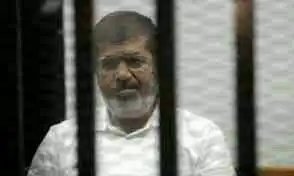
An Egyptian court has sentenced ousted president Mohammed Morsi to death over a mass prison break in 2011, the BBC reports.
The former leader has already been sentenced to 20 years in jail for ordering the arrest and torture of protesters during his time in power.
The country’s religious authorities will now have to give their opinion before the sentence can be carried out.
Morsi was deposed by the military in July 2013 following mass street protests against his rule.
Since then, the authorities have banned his Muslim Brotherhood movement and arrested thousands of his supporters.
Morsi was among more than 100 other defendants sentenced to death for their involvement in mass jail breaks during the 2011 uprising against Egypt’s then-president, Hosni Mubarak.
All death sentences must first be sent to the Grand Mufti, Egypt’s highest religious authority, for his opinion on whether they should stand.
Convictions are still open to appeal, even if the Grand Mufti gives his approval.
Morsi’s supporters have stated tthe cases against him are politically motivated and attempts to give legal cover to a coup, while Morsi has rejected the authority of the courts.
In what appears to be the first violent response to the sentence, suspected Islamic militants in Egypt’s Sinai Peninsula gunned down three judges and wounded three others traveling in a car in the northern Sinai city of al-Arish, according to security officials, who spoke on condition of anonymity because they were not authorized to speak to the media.
As is customary in capital punishment cases, Judge Shaaban el-Shami referred his death sentence on Morsi and the others to the nation’s top Muslim theologian, or mufti, for his non-binding opinion. El-Shami set June 2 for the next hearing. Regardless of the mufti’s ruling, the sentences can be appealed.
Morsi, Egypt’s first freely elected leader, was ousted by the military in July 2013 following days of mass street protests by Egyptians demanding that he be removed because of his divisive policies. Morsi’s successor, Abdel-Fattah el-Sissi, was the military chief at the time and led the ouster. El-Sissi ran for president last year and won the vote in a landslide.
Also sentenced to death with Morsi in the prison break case were 105 defendants, most of them tried and convicted in absentia. They include some 70 Palestinians. Those tried in absentia in Egypt receive automatic retrials once detained.
Supporters of Morsi and his now-outlawed Muslim Brotherhood chanted “down, down with military rule” as el-Shami announced the verdict in the courtroom, a converted lecture hall in the national police academy in an eastern Cairo suburb.
Prosecutors alleged that armed members of the Palestinian Hamas group entered Egypt during the 18-day uprising through illegal tunnels running under the Gaza border with Egypt’s Sinai Peninsula. Taking advantage of the turmoil, the militants fought their way into several prisons, releasing Morsi, more than 30 other Brotherhood leaders and some 20,000 inmates, prosecutors say. Several prison guards were killed and parts of the stormed prisons were damaged.
Those sentenced to death with Morsi on Saturday include the Brotherhood’s spiritual leader, Mohammed Badie, as well as one of the Arab world’s best known Islamic scholars, the Qatar-based Youssef al-Qaradawi.
Hezbollah and Hamas operatives who had been convicted and sentenced to jail terms over terror-related charges were also broken out of jail in 2011. Hundreds of protesters were killed during the uprising and dozens of police stations across the country were stormed by demonstrators. Media commentators maintain that the jailbreaks and the attacks on police stations were part of a Brotherhood plot to spread fear and chaos to ensure the fall of Mubarak.
The Brotherhood went on to win every election held in Egypt between 2011 and Morsi’s ouster in July 2013. Its popularity began to slide after Morsi took office in June 2012 and decreed himself above any sort of oversight later that year. Critics increasingly charged him with working for the Brotherhood and its supporters, not all Egyptians. Morsi’s supporters say he was undermined from the beginning by Mubarak-era holdovers in the security forces and other state institutions.
Hamas is the Palestinian chapter of the Brotherhood and its leaders enjoyed close relations with Morsi during his year in office. It has consistently denied meddling in Egypt’s affairs, including participating in the 2011 mass prison break, but relations between the group and the post-Morsi government in Cairo have been fraught with tension. Egypt frequently accuses Hamas of being behind some of the attacks staged by Islamic militants in northern Sinai since Morsi’s ouster.
Meanwhile, an Islamist opposition alliance led by the Brotherhood meanwhile called on Egyptians to step up the campaign to topple the “gang of treachery and usurpers” in the run-up to July 3, the second anniversary of Morsi’s removal from power.
Amnesty International also denounced the verdicts, which came after several mass death sentences criticized by human rights activists and Western powers. It called for a retrial, asserting that all evidence gathered from Morsi and other defendants were inadmissible because of what it called their illegal detention prior to trial.
“The death penalty has become the favorite tool for the Egyptian authorities to purge the political opposition,” Amnesty stated.
The former president escaped a death sentence in a separate case before el-Shami related to allegations that Morsi, several of his aides and leaders of the Brotherhood allegedly passed state secrets to foreign groups, including Hamas and. Lebanon’s Hezbollah, during his year in office. A total of 16 senior Brotherhood leaders and aides were sentenced to death by el-Shami in that case. The 16 include one woman, Sondos Assem, a presidential press aide who is now a fugitive.